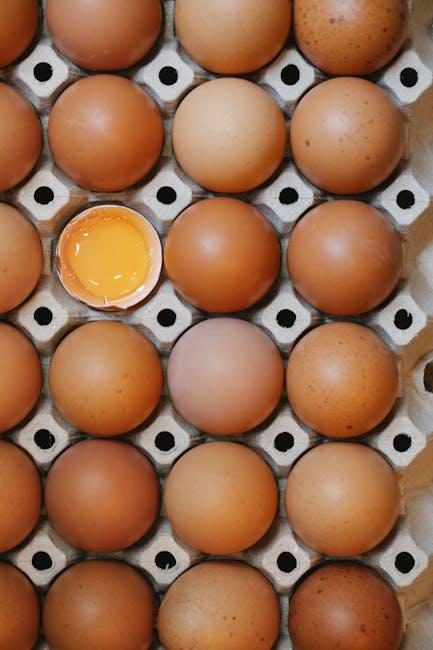When it comes to nourishing our furry companions, pet owners often find themselves navigating a sea of dietary advice and trends. Among the more debated topics is whether dogs should consume raw eggs. This seemingly simple question has stirred discussions among veterinarians, dog enthusiasts, and nutrition experts alike. In this article, we will explore the potential benefits and risks of including raw eggs in your dog’s diet, equipping you with the knowledge to make informed decisions. Whether you’re a seasoned dog owner or a new pet parent, understanding the implications of feeding raw eggs can help ensure your beloved canine remains happy and healthy. Let’s crack open the facts and yolk out the truth about this egg-citing topic!
Understanding the Nutritional Benefits of Raw Eggs for Dogs
Raw eggs are a powerhouse of nutrients that can contribute significantly to your dog’s health when included in their diet appropriately. These natural sources of protein are rich in essential amino acids, which are crucial for muscle development and repair. Eggs also provide a good dose of vitamins such as A, B2, B12, and D, along with essential minerals like iron and selenium, which play vital roles in boosting the immune system and promoting overall well-being.
Including raw eggs in your dog’s diet can also support a glossy coat and healthy skin due to their biotin content. Additionally, the fatty acids present in eggs can aid in joint health and cognitive function. When considering raw eggs as a supplement, ensure they are fresh and sourced from a reliable supplier to minimize the risk of bacterial contamination. Here’s a quick list of benefits:
- High-quality protein for muscle maintenance
- Rich in vitamins A, B2, B12, and D
- Contains essential minerals like iron and selenium
- Supports skin and coat health with biotin
- Provides fatty acids for joint and brain health
Recognizing Potential Risks and How to Mitigate Them
When considering raw eggs for your canine companion, it’s essential to be aware of potential risks and the strategies to address them. Salmonella and E. coli are two primary concerns, as these bacteria can be present in raw eggs and pose health risks to both dogs and humans. While dogs have a more acidic stomach that can handle certain bacteria better than humans, they are not immune. Additionally, raw egg whites contain avidin, an enzyme that can interfere with biotin absorption, potentially leading to skin and coat issues if consumed in large quantities over time.
To mitigate these risks, consider the following:
- Source Quality Eggs: Purchase eggs from reputable sources, preferably organic or free-range, as they are less likely to be contaminated.
- Proper Storage: Store eggs in a cool, dry place to reduce the risk of bacterial growth.
- Moderation is Key: Limit the frequency and quantity of raw eggs in your dog’s diet to avoid nutrient imbalances.
- Consult a Veterinarian: Always seek advice from a vet before introducing raw eggs, especially if your dog has a compromised immune system.
By taking these precautions, you can safely explore the benefits of raw eggs while minimizing the potential downsides for your furry friend.
Best Practices for Introducing Raw Eggs into Your Dogs Diet
When considering adding raw eggs to your dog’s diet, it’s crucial to proceed with care and informed decision-making. Start by ensuring the eggs are fresh and sourced from a reliable provider to minimize the risk of bacterial contamination. It’s recommended to introduce raw eggs gradually into their meals, beginning with small portions to observe any adverse reactions. Keep a close eye on your dog’s stool and overall health during this transition period.
- Check for Allergies: Monitor your dog for any signs of allergic reactions, such as itching or digestive upset.
- Balance the Diet: Ensure that the addition of raw eggs complements your dog’s overall nutritional needs without leading to an imbalance.
- Consult a Vet: Always discuss dietary changes with your veterinarian, especially if your dog has existing health conditions.
By following these guidelines, you can safely enhance your dog’s diet with the nutritional benefits of raw eggs, promoting a healthy and happy pet.
Expert Recommendations for Safe and Healthy Feeding
When considering adding raw eggs to your dog’s diet, it’s essential to weigh both the benefits and potential risks. Veterinarians and canine nutritionists often emphasize the importance of moderation and proper handling. Raw eggs are a rich source of protein, essential fatty acids, and vitamins such as A, B12, and riboflavin. These nutrients can contribute to a shiny coat and healthy skin. However, there are some potential downsides to be aware of.
- Salmonella Risk: Just like humans, dogs can be susceptible to salmonella poisoning. Ensure that the eggs are fresh and have been stored correctly.
- Biotin Deficiency: Raw egg whites contain avidin, an enzyme that can interfere with the absorption of biotin, a crucial B vitamin. This is generally not a concern unless consumed in large quantities.
- Balanced Diet: Raw eggs should not be the sole source of nutrition. Integrate them into a well-rounded diet to maintain balance.
Incorporating raw eggs into your dog’s diet can be beneficial when done thoughtfully. Always consult with your veterinarian to tailor the approach to your dog’s specific needs and health status. By doing so, you can ensure a safe and nutritious feeding regimen for your furry friend.

